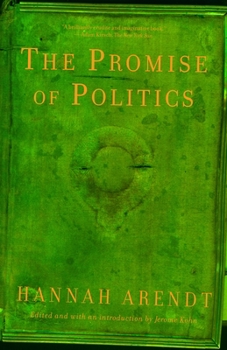The Promise of Politics
Select Format
Select Condition 
Book Overview
In The Promise of Politics, Hannah Arendt examines the conflict between philosophy and politics. In particular, she shows how the tradition of Western political thought, which extends from Plato and... This description may be from another edition of this product.
Format:Paperback
Language:English
ISBN:0805212132
ISBN13:9780805212136
Release Date:June 2007
Publisher:Kuperard
Length:256 Pages
Weight:0.40 lbs.
Dimensions:0.5" x 5.3" x 8.0"
Customer Reviews
2 ratings
Not groundbreaking, but promising
Published by Thriftbooks.com User , 14 years ago
In "The Promise of Politics," Arendt describes how the failure of Western political thought failed to account for human action. The book begins with a twenty-seven page introduction by Jerome Kohn, the editor and actual architect of the Arendt writings which comprise this book. The first half of the book consists of five chapters. In it, Arendt describes the teachings of Socrates (teacher)and Plato (pupil), an examination of Christianity, a change in Montesquieu's observations, Hegel (teacher)and Marx (pupil)are compared and contrasted, and finally, the "end" of traditional political philosophy. The end refers to the end of any conceived relationship between politics and philosophy (ala Aristotle), hence, the end of the tradition of political philosophy. The second half of The Promise of Politics is essentially one large chapter (within the context of the book) titled, "Introduction Into Politics"-- note: not "of" politics, or "about" politics, but "INTO" politics, almost to infer a distinction from an introduction out of politics. "What is politics?" she posits to the reader, and wuickly answers that there is no right philosophical answer. This is because philosophers are only concerned with man, and politics are the activities of men. Arendt discusses the creation and origination of politics and goes on to describe how prejudices may affect a person's judgment within both foreign and domestic policy. After considering the purpose of politics, she then writes that of the meaning of politics, "the meaning of politics is freedom." She then spends time elaborating on this by examining the freedoms afforded by the governments of the Greeks, Romans and Trojans, as well as early American government. Arendt appears to rely pretty heavily on much of Kant's work as she develops her thesis, but work by Nietzsche and Homer are also evident.
Drama Queen
Published by Thriftbooks.com User , 18 years ago
Jerome Kuhn's introduction is a little patronizing of Arendt, but it's short and skimpy and won't deter you from plunging into Arendt's prose, beginning with her startling revision of Socrates. For Arendt, Socrates helped split politics and philosophy with one decisive strategy, his defense at his famous trial. It's typical of Arendt that she sees thought in dramatic terms, always with a terminal at either end of time, existing not so much in essential terms but in contingent, always partial and always temporary states of being--human beings reacting to strain or stress, and in turn launching something new to spur new reaction. Thus Socrates becomes interesting only when in peril. Because so many of these papers were presented as reviews or for occasional purposes (such as lectures) perhaps this emphasis on the dramatic might be explained thus. But oh, how she loved to be able to use "The End of Tradition" as the title of a paper, its apocalyptic note gave her a sort of gleeful, if embarrassed, outrage. The master text here is the longest, the INTRODUCTION INTO POLITICS, oddly titled with "into" in special italics as though there might be an INTRODUCTION "out of" politics, as I suppose there might. It reads like a novel. We haven't had this novella translated into English before now. Whoever translated it did a fabulous job of approximating Arendt's nearly colloquial, clean and rich English. She was a stylist before anything else and this collection, published on the 30th anniversary of her death, burnishes the legend. It's no disgrace and it makes you wonder, if more papers are up there in her archive just waiting for new eyes to take a new look.





